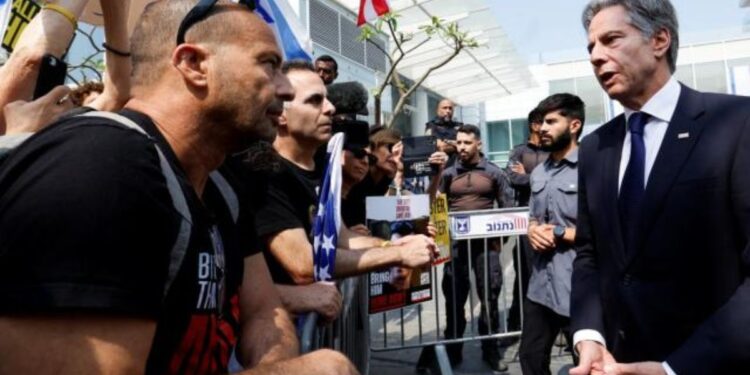During the visit by US Secretary of State Antony Blinken, Israeli Prime Minister Benjamin Netanyahu reportedly made it clear that he would not agree to a ceasefire in Gaza as part of a potential hostage deal. Blinken, on the other hand, advocated for increased aid to Gaza and an immediate truce.
During his latest diplomatic tour of the Middle East, Mr. Blinken met with Mr. Netanyahu in Jerusalem. This visit marked his seventh trip to a region that has been plagued by months of conflict.
In response to the Hamas attack on southern Israel on October 7th, which resulted in the death of approximately 1,200 people and the hostage-taking of another 250 individuals, Israel retaliated by implementing a devastating siege and launching its most intense bombardment on Gaza.
According to Palestinian health officials, the relentless bombardment by Israel has resulted in the tragic loss of over 34,000 lives. The United Nations has also reported that almost half of the population is currently facing a dire and catastrophic hunger crisis.
During a meeting in Jerusalem that lasted for two and a half hours, Mr. Blinken emphasized the significance of expediting and maintaining the delivery of aid into Gaza. He also discussed the ongoing initiatives to achieve an immediate ceasefire and negotiate a hostage exchange agreement.
He is scheduled to visit Ashdod port in the southern region, where aid for Gaza has been provided in response to significant international pressure.
According to Israeli officials, Mr. Netanyahu emphasized during the meeting that he would not agree to any hostage deal that relied on an end to the war.
According to one official, he informed Blinken that we have a keen interest in reaching an agreement and are resolute in our efforts to dismantle Hamas (The Times of Israel).
According to an official, Israel’s most recent offer to Hamas was transmitted through Egyptian mediators towards the end of last week. The official mentioned that Israel is anticipating a response from Hamas on Wednesday evening.
According to Mr. Blinken, Hamas is responsible for obstructing the agreement and he has urged them to accept a truce deal that he considers to be extremely generous. The proposed deal involves the release of 33 hostages in exchange for a greater number of Palestinian prisoners and a cessation of the fighting. It is anticipated that this agreement could pave the way for future progress towards a comprehensive resolution.
“The time is ripe,” Mr. Blinken declared during a meeting with Israeli President Isaac Herzog in Tel Aviv. He emphasized their unwavering commitment to secure a ceasefire that will ensure the safe return of the hostages. This objective must be achieved promptly, and the only obstacle standing in the way is Hamas.”
According to him, there is a proposal currently being considered, and the focus is on moving forward without any delays or excuses. Additionally, he emphasized that the agreement would facilitate the much-needed provision of food, medicine, and water to Gaza.
After his meeting with Mr. Herzog and the families of Americans held by Hamas at his hotel, Mr. Blinken took a moment to greet the several dozen demonstrators who had gathered outside. The protesters were calling for an immediate hostage release deal.
According to a senior official from Hamas, they are currently reviewing the proposed deal. However, they criticized Mr. Blinken for not showing respect to both parties involved and labeled Israel as the main hindrance in the situation.
Sami Abu Zuhri told Reuters that Blinken’s comments contradict reality.
During his visit to Israel, Mr. Blinken highlighted the United States’ stance on an upcoming offensive in the southern city of Rafah. This city is the last refuge for over 1.5 million displaced people in the region, many of whom are currently residing in tents.
President Joe Biden has emphasized the significance of avoiding a bombardment of civilian areas. In several interviews, he has stated that this would be a “red line” and that the United States’ stance could change if Israel does not take appropriate measures to address civilian harm, humanitarian suffering, and the safety of aid workers.










